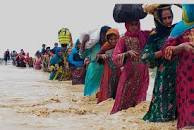By Aftab Hameed Mirani
In the flood of 2022, Pakistan suffered a major setback, entire towns were washed away, and millions of people were displaced and struggled to survive without shelter or clean drinking water. Shocking fact is that this disaster was not unexpected. Because weather forecasts and satellite images had warned for that heavy rainfall weeks before. So, what went wrong that led to inaction? although an early warning system existed. The reality behind this is that we had the data. But we didn’t know how to utilize it effectively or act fast enough. Pakistan is not lagging in the information domain, there is no shortage of disaster- related data, but it suffers from a failure to convert that information into action. This problem is not rooted deeply only in our government systems but also in how international aid and disaster technologies are delivered to us.
Pakistan gets a lot of support from international partners, when it comes to disaster prediction. Organizations like NASA and the United Nations regularly share weather data with Pakistan. China and other countries also help us by providing flood models and early warning tools for any disasters. Apparently by the reports of institutions like, National Disaster Management Authority (NDMA), National Disaster Risk Management Fund (NDRMF) and Ministry of Climate Change, it looks like we are ready. But in reality, gap in coordination, delayed response mechanisms, and poor integration of international data into local systems reveal serious weaknesses. Despite having advanced forecasts, NDMA often struggles with ground level implementation, while NDRMF’s funding mechanisms are slow and overly bureaucratic, limiting timely disaster preparedness. This mismatch between international support and local execution leaves Pakistan vulnerable despite having the tools and knowledge to act.
But when a disaster actually hits, the system falls apart, because all the tools in the world don’t help if the people using them aren’t trained or supported properly. Local authorities often lack equipment, communication systems, or trained staff needed for a quick response. So, while the flood may be predicted, nothing is done in time to reduce its impact. Many of the tools we get from other countries are made with different users in mind. These tools are high tech and having fancy dashboards, apps, and models but they often require fast internet, English proficiency, or specialized training. Most local officials and responders don’t have any of that in Pakistan.
Despite international support and high-tech dashboards from agencies like NASA and the UN, disaster tools remain disconnected from Sindh’s ground realities which is worst effected by climate change. According to the Pakistan Bureau of Statistics’ 2017 Census data, only 39% of households in Tharparkar have access to electricity, while internet connectivity remains severely limited, highlighting the infrastructural gaps that hinder disaster response. These gaps leave officials dependent that appear impressive in donor reports but fail in villages without power or connectivity. What’s needed are low tech, offline ready solutions and proper fund utilization to match international data with local needs.
Despite advanced alerts from PMD and NDMA, many communities, particularly in Sindh and Khyber Pakhtunkhwa, ignored warnings due to repeated failures of the system to deliver help. In June 2025, tourists in Swat waited over an hour for rescue after official warnings, but help never came 17 died when the flash flood hit. In 2010, families near Jacobabad and Sukkur lost homes and children after dismissing warnings, trusting landlords who insisted the waters wouldn’t reach their area. These stories expose a brutal pattern, without clear, trusted, and actionable alerts tied to a responsive system, people choose skepticism, and ignore warnings altogether.
Another problem is our dependence on foreign aid and tech. We rely heavily on data and tools from countries like China or from global agencies. This makes it difficult to build our own systems or act quickly in emergencies. If data is delayed or something doesn’t work, we are stuck. We also miss chances for regional cooperation. For example, the Indus River flows through both India and Pakistan, but due to political tensions, there is very little real time data sharing. In a changing climate, not working together is dangerous.
What we need to do is, first disaster tools and plans must be made with input from local communities. They should be easy to use and work even in low resource settings. For example, using mosque loudspeakers or trusted local leaders to deliver flood warnings could be more effective than relying only on mobile alerts. Second, we must focus on training and building local response teams. It’s not enough to have one central office in Islamabad with experts. Every district should have people who know what to do when a disaster hits.
Third, International aid should focus on building local systems and skills rather than merely donating technology. Bangladesh offers a model with its Cyclone Preparedness Programmed and community led flood shelters that save thousands of lives annually. Nepal’s Local Adaptation Plans of Action (LAPAs), empower villages to design their own flood and landslide responses. These examples show that investing in grassroots capacity works far better than importing tools that don’t fit local realities.
Pakistan’s real challenge is not disasters prediction. It’s timely response. We don’t need more data we need to use what we already have in smarter, faster, and more people-centered approach and the international community also needs to change how it helps. Giving us tools is not enough. What we need is partnership, where local realities are respected, and systems are built to last. If we can close the gap between warnings and action, we can stop disasters from turning into full-blown tragedies.




